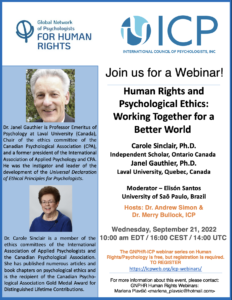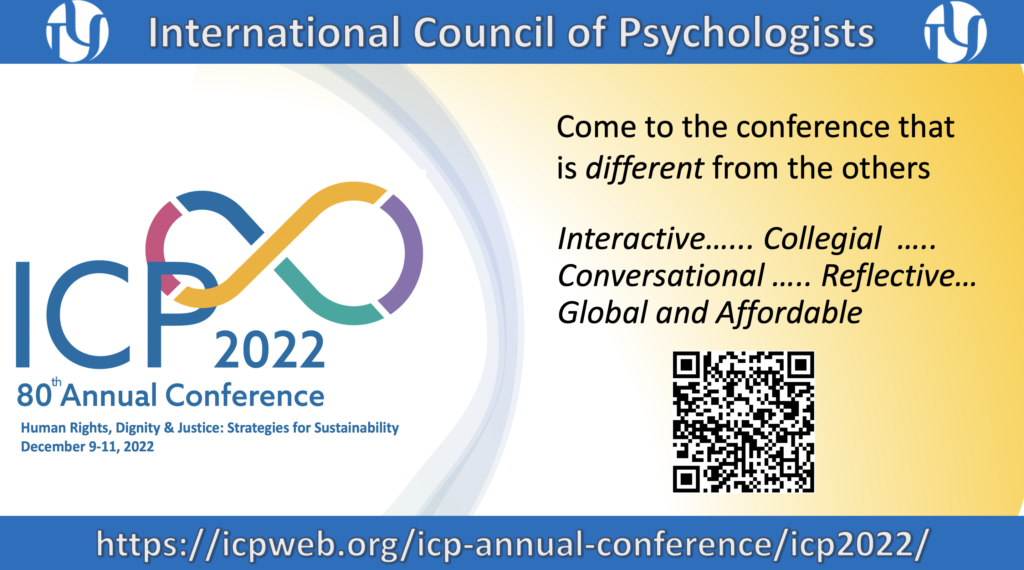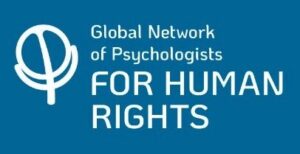
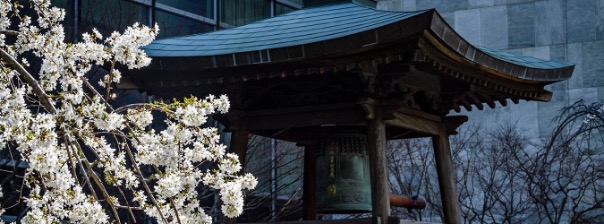
Editor’s Note
The focus in this month’s Bulletin is the International Day of Peace, 21 September. We give also attention to the devastating floods in Pakistan, the causes and consequences.
Table of Contents
Special Focus: International Day of Peace
- Psychology Organizations and Human Rights
- Webinar Series
SPECIAL SECTION

International Day of Peace 21 September
(https://www.un.org/en/observances/indigenous-day)
2022 Theme: End racism. Build peace.
Each year the International Day of Peace is observed around the world on 21 September. The UN General Assembly has declared this as a day devoted to strengthening the ideals of peace, through observing 24 hours of non-violence and cease-fire.
But achieving true peace entails much more than laying down arms. It requires the building of societies where all members feel that they can flourish. It involves creating a world in which people are treated equally, regardless of their race.
As Secretary-General António Guterres said:
“Racism continues to poison institutions, social structures, and everyday life in every society. It continues to be a driver of persistent inequality. And it continues to deny people their fundamental human rights. It destabilizes societies, undermines democracies, erodes the legitimacy of governments, and… the linkages between racism and gender inequality are unmistakable.”
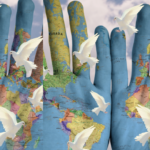 Blog on Peace
Blog on Peace
Peace Education for Human Rights: Building an Open Access Repository
Gabriel Velez. Gabriel Velez, at Marquette University, is part of the Peace Education Working Group of the Society for the Study of Peace, Conflict, and Violence: Peace Psychology Division 48 of the American Psychological Association.
Human rights are integrally linked to peace, especially in its nuanced conceptualization integrating positive and negative responses to structural, cultural, and direct violence. The dignity and respect of all peoples is fundamental to both human rights and peace: peaceful individuals, communities, societies, and the world lay an important and necessary groundwork for providing the conditions that ensure all people’s security, well-being, respect, and thriving. Psychology and psychologists have much to offer at this intersection. Psychological research, evaluation, and clinical practice on a wide variety of topics can contribute to richer understandings of the reasons, effective interventions, and impacts of conflict and human rights violations. These connections, however, are not centered in mainstream psychology. READ MORE
GNPHR NEWS AND EVENTS
Psychology Organizations and Human Rights
The GNPHR Network of Human Rights Groups in Psychology Associations is open to representatives of psychology associations that have established a committee, office, or subgroup focused on psychology and human rights. Minutes of the meetings are here: https://humanrightspsychology.org/resources/human-rights-activities-within-psych-organizations/
The third meeting of the Network of Human rights and psychology groups was held on Monday September 1st, 2022. Notes of the meeting have been posted on the global network website. Link: https://humanrightspsychology.org/minutes-2022-09-01/
The group learned about the important and interesting work of six psychology associations, and is beginning to build a picture of what is happening in different countries. This information will be posted on the GNPHR website. The Network will also be developing some guidelines on how psychology organisations might engage with human rights work, based on the experience of those who have already established groups within their Associations. That will be a topic of discussion at the next meeting in November.
If you are interested in joining the group please do register your interest here https://humanrightspsychology.org/home/about/interest-form-gnphr-working-group/
Webinar Series – Human Rights and Psychology
Next Webinar: September 21, 2022 – 10 am EDT, 4 pm CET
Human Rights and Psychological Ethics- Working Together for a Better World – Janel Gauthier and Carole Sinclair, Canada
Register here
View all webinars in series here https://humanrightspsychology.org/webinarseries
CONTENT AREAS AND NEWS
General
Open Access
Note from Wilson López López, GNPHR Steering Committee Member: Dear friends, Nature magazine published a small article about the Biden government directive on open access to open access to all publicly funded research.. this will have a gigantic impact on the research community, on the publishing community, on institutional governance and on society. As you know I have been contributing to open access in the region for years as co-creator of the REDALYC platform, an open access database, i was part of the other SCIELO database and even of the first health sciences database Bireme , and since a few years ago as ambassador of “Plan S” of the Open Science Coalition. For me it was a matter of contributing to reduce inequality by the costs of publication and access to knowledge, so I am happy because this news implies a very large contribution to access to knowledge in which I have been committed for more than 20 years. But this has many more implications. I will share the article with you. US government reveals big changes to open-access policy. Jeff Tollefson & Richard van Noorden, Nature 609, 234-235, 30 August 2022. https://www.nature.com/articles/d41586-022-02351-1. Biden administration instructs all US agencies to require immediate access to federally funded research after it is published, starting in 2026.
Open Society Foundations
During the last days of July and early August, 2022, the Open Society Foundations commissioned polling of more than 21,000 people living in 22 countries to gauge public opinion on key issues facing the world today. They have issued a report: Fault Lines: Global Perspectives on a World in Crisis (1.83 Mb pdf file)
Between the COVID-19 pandemic, Russia’s invasion of Ukraine, climate change, and the rising cost of living, we are facing multiple once-in-a-generation crises at the same time. But while politicians may be tempted to be cautious, a new poll commissioned by the Open Society Foundations finds that people are still inclined toward solidarity and looking for bolder action.
The survey, which comes ahead of this month’s 77th UN General Assembly, emphasizes the need for “concerted and ambitious responses” from world leaders, according to Open Society President Mark Malloch-Brown. “In difficult times, we tend to focus on what divides us. But this poll shows a common sense of the nexus of crises engulfing the world; we are more united than we think.”
Climate Justice
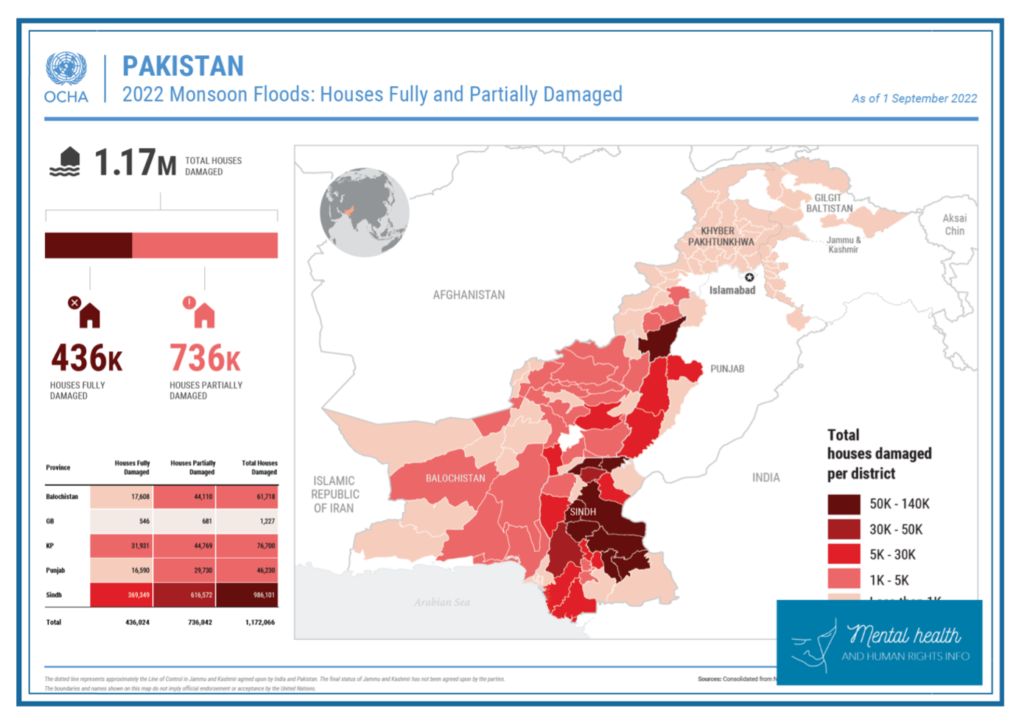
September 2022. Mental health and psychosocial support (MHPSS) information for relief workers supporting survivors of the flood in Pakistan.
The MHPSS has gathered information that can be useful for you as a relief worker or consider yourself as a helper.
Personal Narative from Pakistan – by Dr. Amina Muazzam, GNPHR subscriber and Board Member, International Council of Psychologists
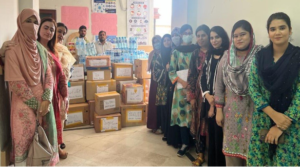 According to the World Bank statistics (2022), more than 2 million people in Pakistan are living below the poverty line. The current floods in Pakistan have caused devastation in the lives of most of these people. The flash floods swept across Pakistan with almost one-third of the country still submerged in water, resulting in the displacement of hundreds and thousands of people who were not prepared for this calamity altogether. Nearly 33 million people have been affected, according to the recent surveys and official reports from the Government of Pakistan. It was after a gap of twelve years that a flood of this magnanimity hit Pakistan, bringing to the front stories of agony. The last time a flood of large scale which came in Pakistan was in year 2010. Most of the people had forgotten that crisis and no strong preventive measures could be taken in this regard…. Read More
According to the World Bank statistics (2022), more than 2 million people in Pakistan are living below the poverty line. The current floods in Pakistan have caused devastation in the lives of most of these people. The flash floods swept across Pakistan with almost one-third of the country still submerged in water, resulting in the displacement of hundreds and thousands of people who were not prepared for this calamity altogether. Nearly 33 million people have been affected, according to the recent surveys and official reports from the Government of Pakistan. It was after a gap of twelve years that a flood of this magnanimity hit Pakistan, bringing to the front stories of agony. The last time a flood of large scale which came in Pakistan was in year 2010. Most of the people had forgotten that crisis and no strong preventive measures could be taken in this regard…. Read More
Why are Pakistan’s floods so extreme this year?
One-third of the country is under water, following an intense heatwave and a long monsoon that has dumped a record amount of rain. Smriti Mallapaty, Nature, 2 September 2022.
With rivers breaking their banks, flash flooding and glacial lakes bursting, Pakistan is experiencing its worst floods this century. At least one-third of the country is under water. Scientists say several factors have contributed to the extreme event, which has displaced some 33 million people and killed more than 1,200.
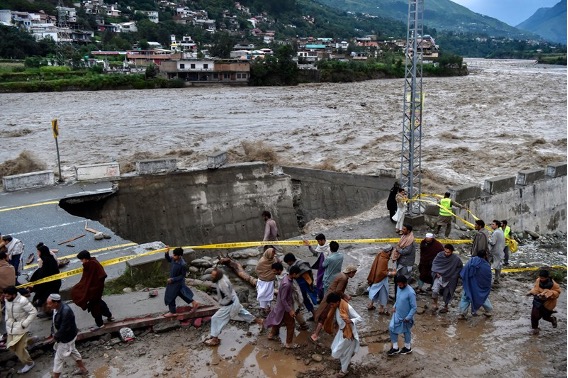
Devastating floods in Pakistan. UNICEF is on the ground working with partners to help children and families. UNICEF, 6 September 2022.
Torrential monsoon rains have triggered the most severe flooding in Pakistan’s recent history, washing away villages and leaving more than three million children in need of humanitarian assistance and at increased risk of waterborne diseases, drowning and malnutrition.
More than 1,200 people, including around 400 children, have lost their lives. Hundreds of thousands of homes have been destroyed, while many public health facilities, water systems and schools have been destroyed or damaged.
Psychoeducational support package for people affected by floods in Pakistan
The IFRC Psychosocial Centre has created a package of psychoeducational materials for emergencies. The package is available in six languages including Sindhi, the language spoken in the Pakistani province Sindh.
“The package give basic useful information to the general public about reactions to crisis events such as floods, supporting children and offering psychological first aid”, says Ea Suzanne Akasha, Technical Advisor in the IFRC Psychosocial Centre.
“When people are in extreme distress, it is important to know how to respond and help them understand their own reactions. Then they can better support others and not only themselves. The folders in the package can be read aloud by volunteers, shared in communities, and used in community meetings to raise awareness of the mental health consequences of crisis events such as floods.”
Suzanne Akasha, T.A. of the IFRC Psychosocial Centre. Relief Web. Download Package here
A Hotter World. Climate change’s effects are already unequal. German Lopez, 2 June 2022, NY Times.
India has contributed little to climate change: Home to 18 percent of the world’s population, it has emitted just 3 percent of planet-warming greenhouse gases.
But India is suffering from climate change. It is happening right now: Over the past three months, a heat wave has devastated North India and neighboring Pakistan. Temperatures surpassed 110 degrees Fahrenheit. It is so hot that overheated birds fell out of the sky in Gurgaon, India, and a historic bridge in northern Pakistan collapsed after melting snow and ice at a glacial lake released a torrent of water. There is a paradox to the climate crisis. Because India never fully industrialized, it has not released as many greenhouse gases as the U.S., European nations and other rich countries. But because it has not industrialized, it also has fewer resources to adapt than the richer, polluting nations.
Decolonization / Indigenization
Reshaping Social Relations in Educational Theory and Practice: A Global Teaching and Decolonizing Collaboration. Melanie E. L. Bush, Adelphi University / UNISA & Nokuthula Hlabangane, University of South Africa, Pedagogy Series 2022, Vol. 2(1) 9-26.
In fall 2018, students from Adelphi University in Garden City, New York and from the University of South Africa in Pretoria embarked on a pilot collaboration to engage conversation and cross-experience exchange. The initiative was rooted in the Adelphi course entitled, “The Reshaping of Social Relations in the Modern World” and through a network of students connected with the University of South Africa (UNISA) Department of Anthropology and Archaeology and decolonizing studies and projects in South Africa. This article provides a theoretical framing for this collaboration and why it holds tremendous potential for engagement, heightened global awareness and developing kinship cross-borders as well as a discussion of the process and the content of this engagement and experience through the lens of student participants’ reflections. Intrinsic to this experience is an exploration of how a psychology of inequity can be challenged.
Rights of Indigenous Peoples
One man dies, and an entire uncontacted tribe vanishes in Brazil. Flávia Milhorance and André Spigariol, August 29, 2022, NY Times.
Known as the “Man of the Hole,” the last member of an Indigenous group was found dead this month, marking the first recorded disappearance of an isolated tribe in the country.
Officials from Brazil’s Indigenous protection agency, Funai, found the man’s body on Aug. 23 during a patrol in the Tanaru Indigenous Territory, in the state of Rondônia, bordering Bolivia.
Even with protections in place, the territory suffered widespread deforestation up until about 13 years ago. Attacks on the last surviving man continued, as well, including one by armed gunmen in 2009, according to local news reports.
Uncontacted tribes are groups that live without sustained contact with the outside world.
Migration, Refugees, Displacement, Statelessness
Refugees and migrants: overexposed yet unseen. Editorial, The Lancet Global Health, September 2022. Open Access.
It is undoubtedly the case, however, that the world is becoming ever more mobile and that refugees and migrants are becoming an increasingly large demographic. Earlier this year, UNHCR’s Global Trends report revealed that the number of people forcibly displaced by conflict, violence, human rights violations, and persecution had surpassed 100 million for the first time on record. New conflicts in Ukraine and Ethiopia, as well as political upheaval in Afghanistan and Myanmar, were prominently in the news, highlighting the very real threats to many ordinary citizens worldwide. Other ongoing military, climatic, and economic crises continued in the background.
Health systems must therefore be reoriented to respond to the needs of refugees and migrants, for the benefit of everyone. This is one of the conclusions of the first ever WHO World Report on the Health of Refugees and Migrants, published last month. Such a reorientation aligns with WHO’S drive towards making primary-health care the foundation of universal health coverage, its focus on health promotion and disease prevention, and the imperative to take a whole-of-government and whole-of-society approach to solutions.
Children born in the largest refugee camp in the world teach us what being stateless means to them. Blog by Sirazul Islam, Youth Director of British Rohingya Community UK (BRC), 4 August 2022.
From being born without a State in the world’s largest refugee camp to struggling to gain nationality in diaspora communities, statelessness has surrounded us our entire lives. The UN declared the Rohingya crisis a ‘genocide’ in 2018, yet there are over 1.5 million Rohingya who are suffering without a State in refugee camps across Bangladesh. This collaboration, by British Rohingya Community UK and ENS, discusses the issue of statelessness and what it means for Rohingya children born in refugee camps who have been brought up in the UK. They are stateless and will probably not have a nationality until they are 18 and can fulfil the extensive requirements to be recognised as British citizens. Many of them did not know why they were stateless, until now.
Racism
White (but Not Black) Americans Continue to See Racism as a Zero-Sum Game;
White Conservatives (but Not Moderates or Liberals) See Themselves as Losing. Raea Rasmussen, David E. Levari , Muna Akhtar, Chelsea S. Crittle, Megan Gately , Jeremy Pagan, Andrea Brennen, Dylan Cashman, Alia N. Wulff, Michael I. Norton, Samuel R. Sommers, and Heather L. Urry, Association for psychological science (APS), 2022.
In a 2011 article in this journal entitled “Whites See Racism as a Zero-Sum Game That They Are Now Losing” (Perspectives on Psychological Science, 6, 215–218), Norton and Sommers assessed Black and White Americans’ perceptions of anti-Black and anti-White bias across the previous 6 decades—from the 1950s to the 2000s. They presented two key findings: White (but not Black) respondents perceived decreases in anti-Black bias to be associated with increases in anti-White bias, signaling the perception that racism is a zero-sum game; White respondents rated anti-White bias as more pronounced than anti-Black bias in the 2000s, signaling the perception that they were losing the zero-sum game.
We collected new data to examine whether the key findings would be evident nearly a decade later and whether political ideology would moderate perceptions. Liberal, moderate, and conservative White (but not Black) Americans alike believed that racism is a zero-sum game. Liberal White Americans saw racism as a zero-sum game they were winning by a lot, moderate White Americans saw it as a game they were winning by only a little, and conservative White Americans saw it as a game they were losing. This work has clear implications for public policy and behavioral science and lays the groundwork for future research that examines to what extent racial differences in perceptions of racism by political ideology are changing over time.
Women and Human Rights
Despite being at forefront of activism, women and girls still face barriers . OHCHR, 6 September 2022,
“Authorities should support the voices of young activists more; instead of silencing or minimizing them, they should be used as platforms to empower, generate a change,” said Meskerem Geset Techane, a member of the Working Group on discrimination against women and girls.
Meskerem made her comments when she presented the Working Group’s recent report during the Human Rights Council. Her words echoed those of a young woman activist who took part in one of the consultations with the Working Group.
The report on girls and young women activism highlights the profound contributions made by girls and young women to the promotion of gender equality and the advancement of human rights, as well as examines the structural barriers to the exercise of their activism.
Learn more about what change is needed to ensure all girls and young women have their voices heard, and what you can do to make a difference in the report: Making sure women and girls are always heard.
Malaysia: UN experts denounce gender-discriminatory citizenship law. OHCHR, Geneva, 5 September 2022.
UN experts* today denounced a recent court decision in Malaysia that denied women the same rights as men to automatically confer citizenship to their children, saying affected women are less likely to leave abusive relationships and their children risk statelessness. The decision contravenes Malaysia’s obligations under international law and the need to interpret all constitutional provisions concerning citizenship, and its transference, without discrimination based on sex.
In August 2022, Malaysia’s Court of Appeal overturned a landmark 2021 High Court ruling which would have allowed Malaysian mothers married to foreign spouses the right to pass down citizenship to children born abroad. The country remains one of a handful in the world in which women cannot confer citizenship based on their nationality to their partners and children on an equal basis with men.
UN experts have previously called on Malaysia’s Government to ensure that Malaysian women can enjoy equal rights in relation to nationality and citizenship.
REGIONAL HUMAN RIGHTS NEWS
Africa-Middle East Regional Forum to spotlight stronger protection for minorities and mark 30th anniversary of UN Declaration on Minorities. OHCHR, 6 September 2022.
GENEVA (6 September 2022) – The Africa-Middle East Regional Forum on minority issues will take place from 6-7 September 2022, with a focus on building stronger recognition and protection for the rights of minorities. The forum will mark the 30th anniversary of the UN Declaration on the Rights of Persons Belonging to National or Ethnic, Religious and Linguistic Minorities.
UN Special Rapporteur on minority issues Fernand de Varennes will convene the Regional Forum in coordination with the Tom Lantos Institute. The forum will be held online and will be open to the media. “Review-Rethink-Reform is the theme of this year’s Regional Forum. The time has come to reflect on the challenges facing minorities in Africa and the Middle East, the extent their situation has evolved in the last 30 years, and what is needed to build stronger rights recognition and protection, including in the region,” de Varennes said.
Young people to fight impunity in Madagascar. OHCHR, 29 August 2022.
Trained by the Rary Aro Mada project, young human rights defenders contribute to the monitoring of human rights violations and the fight against impunity in Madagascar. “With over 50% of the Madagascar population under 20 years of age, the participation of youth in addressing the root causes of conflict is essential if we are to succeed in consolidating sustainable peace,” said Sabine Lauber, Senior Human Rights Adviser for the UN Country Team. The Rary Aro Mada project that supports the protection of young human rights defenders and peace builders has just entered its second phase with the establishment of regional human rights observatories.
PUBLICATIONS
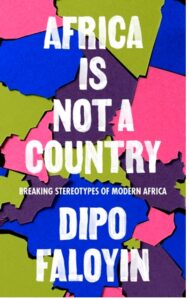 Reminder: ‘Africa Is Not a Country’. Dipo Faloyin is tired of Western stereotypes. Michela Wrong, Aug. 31, 2022, NY Times. AFRICA IS NOT A COUNTRY: Notes on a Bright Continent | By Dipo Faloyin | 380 pp. | W. W. Norton & Company.
Reminder: ‘Africa Is Not a Country’. Dipo Faloyin is tired of Western stereotypes. Michela Wrong, Aug. 31, 2022, NY Times. AFRICA IS NOT A COUNTRY: Notes on a Bright Continent | By Dipo Faloyin | 380 pp. | W. W. Norton & Company.
Upcoming Events
Irish Travellers / Mincéirs and the State, 1922-2022. Moore Institute.
Conference September 16 @ 9:00 am – September 17 @ 5:30 pm
This two-day conference will examine Irish Travellers’ experiences of discrimination since the foundation of the state, paying particular attention to the state’s role in perpetuating disadvantage. It will be a multi-disciplinary and participative conference, with presentations in a variety of formats, and featuring local, national and international perspectives. There will be contributions from Traveller / Mincéir activists and advocates, historians, folklorists, psychologists, sociologists, artists, cultural theorists and others.
Sept 28-29: INTERNATIONAL CONFERENCE Diversity – Equity – Inclusion
Problems, needs, barriers, and perspectives for inclusion of students with impairments.
Kraków, 27th-28th September, 2022, organized as part of the project Academy of Equal Chances and held with the endorsement of Andrzej Frycz Modrzewski Krakow University.
As conference organizers we find a complex and multidimensional nature of issues related to full participation of young people with disabilities in university education a good basis for fruitful discussions. The conference will be opportunity for specialists representing various academic disciplines and business sectors to discuss their experiences, ideas, and thoughts with other members of the international community. Particularly, we address our invitation to scholars – sociologists, psychologists, special education teachers, healthcare professionals, lawyers, architects, and all those who act for social inclusion of people with disabilities and their equality in access to higher education and the experience of studying.
The conference is organised as part of the ‘Academy of Equal Chances’ project, co-financed by the European Union under the European Social Fund, Operational Programme Knowledge Education Development 2014-2020, Priority Axis III. Higher education for economy and development, Measure 3.5 Comprehensive programmes of higher education institution.
November 6-9: 9th World Congress on Women’s Mental Health
International Association for Women’s Mental Health
6 – 9 November 2022 | MECC Maastricht – The Netherlands
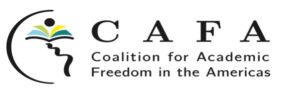 November 15-16; Coalition for Academic Freedom in the Americas (español)
November 15-16; Coalition for Academic Freedom in the Americas (español)
Save the date!
Join Scholars at Risk and our partners on the for an inaugural regional conference on academic freedom in the Americas this November 10th and 11th. The event will take place online and in person, at Universidad de Monterrey, Mexico. The Coalition–led by University of Ottawa’s Human Rights Research and Education Centre, Universidad de Monterrey, and SAR–will bring together civil society, researchers, academics, and students for this hybrid event, which will set the agenda for best practices in protecting and promoting academic freedom in the region.
We are currently seeking applications from prospective panelists and would welcome a wide range of contributions, from country-focused assessments of academic freedom to the adoption of academic freedom policies by higher education institutions. To contribute to the conference, make a submission in response to this call for papers. Follow @CAFA-CLAA to learn more.
And more good news. The Coalition has been invited by the Inter-American Commission on Human Rights (IACHR) to be a part of an academic network and to support their work monitoring and implementing the new Inter-American Principles on Academic Freedom and University Autonomy throughout the region. This network was established in 2021, with SAR and its partners as inaugural members. The invitation to engage for a second year in this work and maintain our partnership with the IACHR is a significant positive sign for our work in the Americas going forward. All work we couldn’t be doing without each of you.
NOVEMBER 17-19, 2022: 17th Symposium on the Contributions of Psychology to Peace
Peace Psychology and Global Challenges in 2022, 17-19 November 2022, Online
The theme of the International Network of Peace Psychology’s 17th biennial symposium is “Peace Psychology and Global Challenges in 2022.” The event will be held online over three days from 17-19 November (18-20 November for those in Australia/New Zealand). The symposium aims to bring together scholars, practitioners, and activists committed to promoting peace and social justice through their research and practice to discuss the pressing issues facing our world today. Invited speakers include Prof. Winnifred Louis, Prof. Wilson López, and Prof. Emeritus Dan Christie.
Call for Abstracts
The symposium organisers are currently seeking abstract submissions to the following streams:
- Young people and peace
- Culture, religion and peace-building
- Social movements and political and social transformation
- War, conflict and peace-building
To submit your abstract, please complete this form. Abstract submissions close on 31 August 2022.
Submissions from presenters living in countries affected by armed conflict are encouraged. Accepted presentations may contribute to a special issue of Peace and Conflict: Journal of Peace Psychology.
CONTACTS: Published by the Global Network of Psychologists for Human Rights – www.humanrightspsychology.org
Disclaimer: The website of the Global Network of Psychologists for Human Rights (GNPHR) contains articles, events and news about the domain where psychology and human rights intersect. The information presented in this Bulletin, does not imply that the GNPHR shares the views and beliefs in the articles.
- @GNPHR1
- How to get involved – read how you can contribute to the global network
- Consider contributing a Blog/Commentary
- News and Bulletins from the GNPHR – Subscribe to GNPHR
- Email addresses:
Ways to Participate in Global Network Activities
- Student/young person representation on the GNPHR Steering Committee
Are you a student or young person (under 35 years of age) interested in joining the GNPHR Steering Committee? The GNPHR invites applications. Role description: The terms of reference broadly define the roles of all members of the steering group. Individual steering committee member tasks include : Each member will take responsibility for one of the following: (a) A specific content area or group of areas; (b) A specific project (e.g. survey of human rights reporting mechanisms; survey of educational programs in psychology/human rights, etc); (c) A specific function: for example, organizing a newsletter; soliciting commentary or newsletter blogs; seeking grant possibilities; outreach to general human rights organizations; outreach to psychology organizations or (d) Consultation: Working in collaboration with other organisations where there is a specific issue. In addition, from time-to-time, short-term subgroups may work on specific projects. In addition, for the student member, there would be a specific remit to liaise with other organisations that are focussed on younger people, psychology and human rights. Click here if you are interested in being nominated. - Share Your Experiences and Examples
One of the best ways to illustrate the intersection of psychology and human rights is through example. We are looking for examples of your encounters with human rights issues in your professional life. You might describe a time when you protected (or failed to protect) human rights, or advocated for what you saw as a human rights issue. The events might be in your clinical, research, academic, applied, or volunteer work. Please send your narrative / story (500-1000 words) to Marlena Plavšić (marlena_plavsic@hotmail.com). We will compile these for publication in the GNPHR Bulletin and on the website. Please also indicate if you would like your stories to remain anonymous. - Share your Expertise and Opinions
We invite you to contribute a blog or opinion piece on general human rights issues; human rights education or strategies for raising the profile of human rights within psychology or your professional life. Students are welcome to contribute, including on student needs for learning about and addressing human rights. Please contact the GNPHR Blog editor (blogeditor@humanrightspsychology.org) with ideas for the article you would like to write! - Send articles/news/events
If you come across a human rights article or news, or know of an upcoming hunman rights event, please send for publication in the Bulletin. Send to the Bulletin editor Polli Hagenaars (polli.hagenaars@gmail.com).

